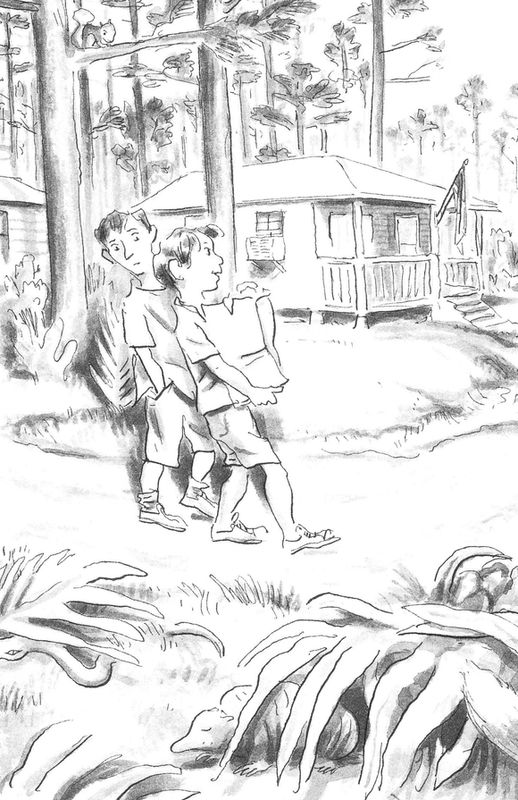Ben’s cheeks flushed. He mumbled, “Lamps.”
Cindy brought some out from the rear of the store. Elliot grinned, but he didn’t say anything.
Ben muttered an explanation about Goomby’s project. “I’ll take those two.” He thrust the money at Cindy, longing to get out of there. She put the lamps in a little box and gave him his change. He stuffed it all in with the groceries and bolted from the shop.
Elliot came with him. “You and your folks going to move into a dollhouse?” He chuckled. “Not much of a change for you, I guess.”
Elliot never missed a chance to remind Ben that their home was only a wooden bungalow in a clearing in the woods, while the Lortons—Elliot and his mother and father—lived in a nice big house in town.
Ben didn’t answer this. He said, “Well, so long,” and sprinted around the corner.
But Elliot was right there with him. “What’s the rush? It’s too hot to hurry.”
It was. The withering heat, laced with smoke from the fires, made the air feel hard to breathe, and carrying the big grocery bag didn’t help. Ben slowed down. They trudged along silently, kicking up dust from the dry dirt road.
As they neared Ben’s bungalow, Elliot asked, “Do animals live in the woods?”
“Sure. Millions of ’em.”
Elliot glanced at the trees beside the road. “You see them much?”
A squirrel chittered in a pine. An armadillo rustled through some fallen palm fronds, right beside the road. Ben said, “There’s a couple right there.”
“I meant bigger animals.”

“We see deer a lot, mostly when it’s getting dark. Foxes sometimes. There’s bears and bobcats too, but they don’t come out as much. And where the creek goes through the trees, there’s alligators, and—”
“Snakes?” Elliot broke in.
“Well, yeah. Sure.”
Elliot shied away from the woods. “What a place to live,” he said in disgust. Then he added amiably, “No offense.”
Ben gritted his teeth. This was his place to live, and he liked it. And he didn’t like Elliot for trying to make him ashamed of it.
They reached his house. Elliot said, “Air-conditioning would feel good right now. But I guess you don’t have that.”
“Yes, we do,” Ben answered stiffly. “You can come in, if you want.”
Elliot followed him.
It was cool in the bungalow. Their air conditioners were noisy window units, but they worked fine.
Goomby said hello to Elliot. He answered quickly and politely, “Morning, ma’am. Another hot day.”
Goomby nodded. She thanked Ben for the groceries and the change and put them away. “These must be for you.” She gave him the caramels. Ben stuffed them in his pocket for later.
She opened the box with the little lamps in it. Ben hoped any talk about them would be brief.
“They’re perfect,” Goomby said. “How about some lemonade? You boys thirsty?”
“Yes!” Ben said.
“That would be great.” Elliot smiled.
They sat at the kitchen table. Goomby poured out two big glasses. While they drank the sweet cold lemonade, she put a ham on to boil. They would have it sliced cold at the picnic tomorrow. She rolled chicken pieces in cornmeal and placed them in the big skillet to fry. The kitchen began to smell delicious.
Ben and Elliot seemed to have nothing more to say to each other, and Ben wished the other boy
would leave. But Elliot looked as if he were settling down for a while. He hummed, sipped the last of his drink, tapped his fingers on the table. He looked bored. Elliot often looked that way, as if there were better things to do—anywhere but here.
“Want to play checkers?” Ben asked finally. He was getting bored himself, just sitting here.
Elliot shrugged. “I guess so.”
They played three games. Elliot lost all three. Ben was pretty good at checkers, but Elliot said he was used to playing with much better players and that Ben’s blunders had thrown him off his game.
Ben snorted and replied, “Oh, yeah? Last year I beat three champions over in Carville. There was a contest and they’d already played some other guys, and these were the winners, and I beat ’em all.”
This wasn’t quite true—he had actually beaten one of them and lost to the other two—but today Elliot had lost fair and square, and Ben hated his attitude. He tossed the pieces in the box and
folded the board, saying, “That’s enough checkers.”
At last Elliot got up to leave. Then Miss Alice, their neighbor up the road, rang her I’ve-got-news bell, and Goomby said, “Oh, dear, I wonder what Alice wants to tell us. I hope it’s nothing bad.”
Elliot rolled his eyes. One of the many things he thought was funny about Bending Creek was the way people rang bells to say things, but Ben knew it was a good system, here in the country. Mr. Hendrick, who lived on the other side of Miss Alice, always used a brass bell to call his cats in at night. Goomby rang her noisy old come-home bell to call the family in to supper. And Miss Alice gathered the neighbors this way when she had something special to say.
Ben liked the bells. They were like voices to him, the voices of Bending Creek—his family, his neighbors, his friends.
Goomby turned off the burner under the ham. She finished frying the chicken and put the pieces
onto paper toweling to drain and cool. She turned off that burner, too, and double-checked to be sure she hadn’t left anything on. The threat of fire made everyone extra careful.
Then she whisked off her apron and they all went next door to hear Miss Alice’s news.